
Jamiroquai are an English acid jazz and funk band from London. Formed in 1992, they are fronted by vocalist Jay Kay, and were prominent in the London-based funk and acid jazz movement of the 1990s. They built on their acid jazz sound in their early releases and later drew from rock, disco, electronic and Latin music genres. Lyrically, the group has addressed social and environmental justice. Kay has remained as the only original member through several line-up changes.
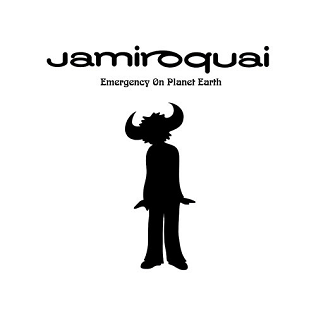
Emergency on Planet Earth is the debut studio album by English funk and acid jazz band Jamiroquai, released on 14 June 1993 under Sony Soho Square. Prior its release, the band debuted in 1992 with "When You Gonna Learn" under Acid Jazz Records, and front-man Jay Kay was given a major-label deal with Sony Music. The album was produced as Toby, Stuart and Kay formed the band and is characterised by its acid jazz foundations, layers of instrumentation and socially charged lyrics.

The Return of the Space Cowboy is the second album by English funk and acid jazz band Jamiroquai. The album was released on 17 October 1994 under Sony Soho Square. The album continues the musical direction of their debut, Emergency on Planet Earth (1993), and is characterised by its complex songwriting as a result of Jay Kay's creative block mid-production. Its lyrics addressed street life, hope, loss, Kay's drug use, and social matters regarding Native Americans and youth protests.

The Secret Life of the Waterboys 81–85 is an album of outtakes, live tracks and demos by the Waterboys, released by Chrysalis on 24 October 1994.

"Cosmic Girl" is the second single from British funk and acid jazz band Jamiroquai's third studio album, Travelling Without Moving (1996). The song was released in the United Kingdom on 25 November 1996 via Sony Soho Square and in the United States in 1997 via Work Group. It was written by Jay Kay and Derrick McKenzie, and produced by Rick Pope, achieving great chart success, peaking at No. 6 on the UK Singles Chart. The song also reached No. 3 in Italy, No. 4 in Iceland, and No. 10 in Finland. The accompanying music video was directed by Adrian Moat and filmed in Spain. The B-side to the single is an instrumental, "Slipin' 'N' Slidin'", a song originating from another Jamiroquai track called "Mr Boogie", which was a live-only song. "Slipin 'N' Slidin'", just like "Mr Boogie", also has a vocal version.

"When You Gonna Learn" is a song by British funk/acid jazz band Jamiroquai, released as their debut single. It was originally released in October 1992 by Acid Jazz Records before being re-released on Sony Records in September 1993 as the lead single from the band's debut studio album, Emergency on Planet Earth (1993). The lyrical themes, like many of Jamiroquai's early songs, speak of environmental awareness and unfettered capitalism. Its music video was directed by Morgan Lawley and was banned from MTV in its original edit.
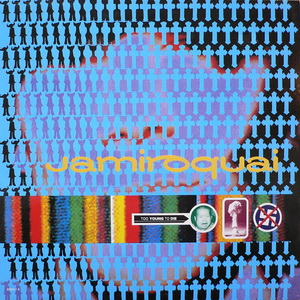
"Too Young to Die" is a song by British funk and acid jazz band Jamiroquai, released in March 1993 by Sony Soho Square as the second single from their debut studio album, Emergency on Planet Earth (1993). The song was written by lead singer Jason Kay and Toby Smith, and produced by Kay. The original version of the track runs at 10:18; however, both the single and album versions were cut, running at 3:22 and 6:05, respectively. The single received positive reviews from music critics, who compared Jay Kay to Stevie Wonder.
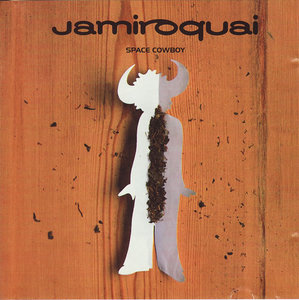
"Space Cowboy" is the international lead single from British funk and acid jazz band Jamiroquai's second studio album, The Return of the Space Cowboy (1994). Released on 26 September 1994 by Sony Soho Square, the single peaked at number 17 on the UK Singles Chart, number six in Italy, and number three in Iceland. In the United States, it gave the band their first number one on the Billboard Hot Dance Club Play chart. In June 2006, it re-entered the UK Dance Chart at number one. Its music video was directed by Vaughan Arnell and Anthea Benton. The single contains remixes by David Morales, which further put the single in club circulation.

"Avenue" is a song by British pop group Saint Etienne, released in October 1992 as the first single from their second album, So Tough (1992). It was originally titled "Lovely Heart" or "Young Heart". The album version is a 7-minute version with lengthy instrumental sequences; it was edited down to around 4 minutes for radio play, though the commercial single contained the full-length version, with the radio edit only released on promotional material. The edit wasn't released commercially until 2005's Travel Edition 1990-2005.

"Emergency on Planet Earth" is a song by British funk/acid jazz band Jamiroquai, released in August 1993 by Sony Soho Square as the fourth and final single from the band's debut studio album of the same name (1993). The song was written by frontman Jay Kay, and has an environmentalist tone, urging the listener to "stop modernisation going on." The track peaked at number 14 on the UK Singles Chart and at number four on the US Dance Chart.

"Light Years" is a song by the British funk and acid jazz band Jamiroquai, originally released in 1994 as a song from their second studio album, The Return of the Space Cowboy (1994). It was released as a single on 12 February 1995 by Sony Soho Square and Work, but failed to chart on the UK Singles Chart due to the release being cancelled at the eleventh hour.
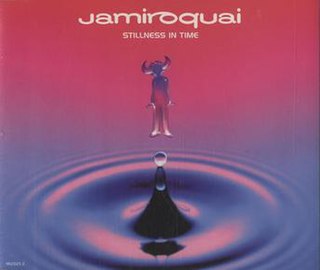
"Stillness in Time" is a song by British funk and acid jazz band Jamiroquai, released in 1994 on their second studio album, The Return of the Space Cowboy (1994), and the year after as a single by Sony Soho Square. The track was written by Jay Kay and Toby Smith, and peaked at number nine on the UK Singles Chart, making it the group's highest-charting release to that date. It also reached number one on the UK Dance Chart and number 14 in Scotland.

"Half the Man" is a song by British funk/acid jazz band Jamiroquai, released in November 1994 by S2 Records as a single from their second studio album, The Return of the Space Cowboy (1994). The song peaked at number 15 on the UK Singles Chart. Its music video was directed by Paul Boyd. "Half the Man" is in the key of D major.

"Blow Your Mind" is the third overall single to be released from British funk/acid jazz band Jamiroquai's debut studio album, Emergency on Planet Earth (1993). It was released on 24 May 1993 through Sony Soho Square in the United Kingdom, peaking at number 12 on the UK Singles Chart. The song was written by frontman Jay Kay with Toby Smith, and produced by Rick Pope. Its accompanying music video was directed by Vaughan Arnell and Anthea Benton.

"Delicate" is a song by American singer-songwriter Terence Trent D'Arby featuring English singer Des'ree, released on June 7, 1993 by Columbia Records as the third single from his third studio album, Symphony or Damn (1993). It was written, arranged and produced by D'Arby, and peaked at number 14 on the UK Singles Chart. In the US, the song reached numbers 74 and 65 on the Billboard Hot 100 and Cash Box Top 100. Its music video was directed by Andy Morahan.
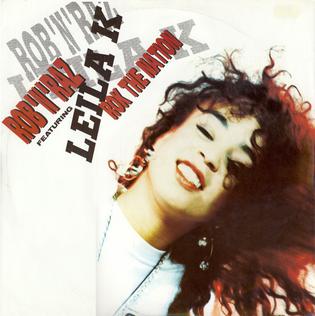
"Rok the Nation" is a song by Swedish electronic music duo Rob'n'Raz featuring rapper Leila K, released in March 1990 by BMG as the second single from their debut album, Rob'n'Raz feat. Leila K (1990). It peaked at number three in both Sweden and Finland. Additionally, the song was a top-20 hit in the Netherlands and Switzerland, and a top-30 hit in Ireland and West Germany. In the UK, "Rok the Nation" reached number 41 on the UK Singles Chart.

"What Cha Gonna Do with My Lovin'" is a song by American singer and songwriter Stephanie Mills, released in July 1979 as the first single from the album of the same name (1979). It became a hit, reaching No. 22 on the US Billboard Hot 100. It was also a top 10 hit on the Billboard R&B chart, as well as a minor hit in Canada.
"I Talk to the Wind" is the second track from the British progressive rock band King Crimson's debut album, In the Court of the Crimson King (1969).

"Runaway" is a song recorded, written and produced by New York City-based group Deee-Lite, released on May 28, 1992 by Elektra Records as the lead single from their second studio album, Infinity Within (1992). It is the group's fourth single to top the US Billboard Dance Club Songs chart. In Europe, the song was a top-10 hit in Greece and a top-20 hit in Finland, as well as peaking at number nine on the UK Dance Singles Chart and number 12 on the European Dance Radio Chart. The music video for "Runaway" was directed by American filmmaker and artist Gus Van Sant.

"U R the Best Thing" is the debut single of Northern Irish musical group D:Ream, included on their first album, D:Ream On Volume 1 (1993). Originally a club hit released in 1992, the song has been remixed and re-released twice: in 1993 and in 1994. The 1994 version, also known as the Perfecto mix, was most successful peaking at number three in Scotland, number four on the UK Singles Chart and number six in Ireland. It also peaked at number 13 on the Eurochart Hot 100. The 1993 version reached number one on the Billboard Hot Dance Club Play chart in the US. There were made three different music videos to promote the single; the 1994 version was directed by Marcus Nispel.



















